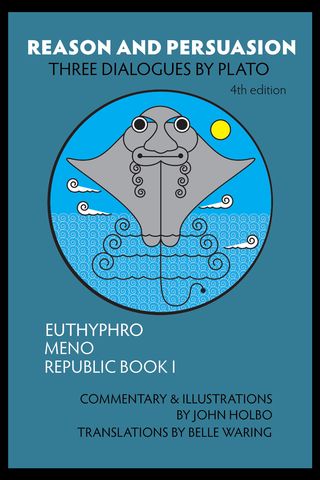It’s been a year since Belle and I self-published the latest edition of Reason and Persuasion [amazon], after the original publisher reverted the rights to us. The self-publishing model for our book works ok. We give away the PDF. But you can buy the paper and get a free Kindle version to go with; or just get the Kindle for $1.99. Such a bargain! Or get it from iBooks. All major ebook formats available. We’ve sold a couple hundred copies this year; given away thousands more as free downloads. (I hope you remembered to buy a copy for the person on your list who had everything … except a copy of our book!) I keep hoping it will catch on as a standard textbook in virtue of its obvious economic advantages – and it’s good philosophically, too. But if we just keep bobbing between the 100,000 and 1,000,000 sales ranks on Amazon, I can live with that. But if YOU have a friend looking for a Plato text for some intro course, kindly give them our card.
Several years ago I was more involved in e-publishing stuff generally. It seemed to me so obvious that academic writing – a reputation economy – wants to be almost free. Certainly it is perverse to have a significant segment of the academic publishing industry hitched to a distribution system in which exorbitantly overpriced paper products are sold in tiny runs to a select few university libraries. My minor intellectual interventions into all that took place before the ebook revolution. Remember when people read blogs? Yeah: then!
What has happened since? Everyone reads ebooks now. I haven’t really kept my finger on the pulse of academic publishing economics and informatics and so forth. My sense is that academic publishing is generally 3-steps forward, 1-step back. Things get better but sometimes advances make room for new stupidities that, even in the recent past, we couldn’t have managed to pull off. As an academic with login privileges at my university library, I can get way more stuff than just a few years ago. It’s nice to live in a house in which new doors just magically appear, from time to time. But a lot of people don’t have access to that goodness – even though the web itself, of course, always contains more and more. What do you think is the good news and bad news about academic e-publishing, in 2017? Tell me tales, in case I want to sound knowledgable about it some time soon.
One sign: I feel that ‘e-publishing’ – the term – is on the verge of going the way of ‘electric guitar’. We still use it, but soon we are going to need a term that, once upon a time, would have been pleonastic: acoustic guitar. Paper publishing. The balance has shifted.

{ 12 comments }
divelly 01.02.17 at 5:55 pm
You are a saint. I was once forced to purchase a $135 text authored by the Prof. for a required course.
John Holbo 01.03.17 at 2:21 am
Thank you kindly!
mjfgates 01.03.17 at 5:46 am
What’s mostly going for people who don’t have the login now is that instead of buying the book, you buy a secret code that lets you access the website… for the quarter, or if you’re lucky for the year. All of the expense, none of the ability to dig up your old calculus text when you can’t remember the Chain Rule. It’s very 2016, somehow. (Didn’t the hobbits at the end of “Lord of the Rings” call really good beer “proper fourteen-thirty?” “2016” seems a lot like that, sort of.)
SamChevre 01.03.17 at 2:12 pm
Thank you; I just bought the e-book for my own enjoyment.
TheSophist 01.03.17 at 6:00 pm
@mjfgates: It’s actually “proper 1420”. (The ring was destroyed in 3019, and Shire Reckoning is exactly 1600 behind. The superlative harvest (and beer) was the next year.)
I have a friend whose ex-wife runs a microbrewery in Colorado. Their premium brew is called “1420”. When my friend pointed out that nobody would get the reference, she replied “One day somebody will, and that will be glorious.”
harry b 01.03.17 at 6:33 pm
OT, but responding to the Sophist’s friend’s ex-wife’s joke. I went to Burnham Grammar School in the 1970s. Like most English secondary schools (even non-posh ones) we had a house system. Our houses were, imaginatively, called Red, Blue, Green, Yellow (which tells you we weren’t posh, though certainly the school had pretentions). In 1977 the names were changed, at the suggestion of an enterprising History teacher (a gay, High anglican, Tory — probably the first openly gay person I knew) to Latimer, Cranmer, Hooper, and Ridley.
I didn’t get the joke till 2002 (if you don’t get it, it’s a pun – if there’s demand, I’ll give you clue later). I have no idea who got the joke at the time – I don’t even know if the (not very good, and seemingly humourless) Head got it (though I have no doubt that the academic Deputy Head, an elderly, kind, and very talented woman who taught Latin extremely well, and probably should have been doing something much more important, got it). Getting a joke 25 years after it was made: that’s glorious.
Maria 01.04.17 at 3:16 pm
I have the hard copy and I love it!
Mostly for the pictures, if I’m honest. ;-)
not me 01.05.17 at 12:08 am
It took me a minute, but I think I got harry b’s teacher’s joke, which is indeed pretty great.
John Quiggin 01.05.17 at 7:26 am
I’m going to need a hint, I think
Neil 01.05.17 at 11:24 am
Hooper is obviously the odd one out, since the others are the Oxford martyrs. Beyond that, I’ve got nothing.
sperry 01.06.17 at 1:45 pm
The name of the school is where the pun comes in, I think.
John Quiggin 01.06.17 at 11:55 pm
@11 D’oh!
Comments on this entry are closed.